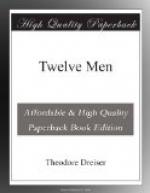But his great forte was of course his song-writing, and of this, before I speak of anything else, I wish to have my say. It was a gift, quite a compelling one, out of which, before he died, he had made thousands, all spent in the manner described. Never having the least power to interpret anything in a fine musical way, still he was always full of music of a tender, sometimes sad, sometimes gay, kind—that of the ballad-maker of a nation. He was constantly attempting to work them out of himself, not quickly but slowly, brooding as it were over the piano wherever he might find one and could have a little solitude, at times on the organ (his favorite instrument), improvising various sad or wistful strains, some of which he jotted down, others of which, having mastered, he strove to fit words to. At such times he preferred to be alone or with some one whose temperament in no way clashed but rather harmonized with his own. Living with one of my sisters for a period of years, he had a room specially fitted up for his composing work, a very small room for so very large a man, within which he would shut himself and thrum a melody by the hour, especially toward evening or at night. He seemed to have a peculiar fondness for the twilight hour, and at this time might thrum over one strain and another until over some particular one, a new song usually, he would be in tears!
And what pale little things they were really, mere bits and scraps of sentiment and melodrama in story form, most asinine sighings over home and mother and lost sweethearts and dead heroes such as never were in real life, and yet with something about them, in the music at least, which always appealed to me intensely and must have appealed to others, since they attained so wide a circulation. They bespoke, as I always felt, a wistful, seeking, uncertain temperament, tender and illusioned, with no practical knowledge of any side of life, but full of a true poetic feeling for the mystery and pathos of life and death, the wonder of the waters, the stars, the flowers, accidents of life, success, failure. Beginning with a song called “Wide Wings” (published by a small retail music-house in Evansville, Indiana), and followed by such national successes as “The Letter That Never Came,” “I Believe It, For My Mother Told Me So” (!), “The Convict and the Bird,” “The Pardon Came Too Late,” “Just Tell Them That You Saw Me,” “The Blue and the Grey,” “On the Bowery,” “On the Banks of the Wabash,” and a number of others, he was never content to rest and never really happy, I think, save when composing. During this time, however, he was at different periods all the things I have described—a black-face monologue artist, an end- and at times a middle-man, a publisher, and so on.
I recall being with him at the time he composed two of his most famous successes: “Just Tell Them That You Saw Me,” and “On the Banks of the Wabash,” and noting his peculiar mood, almost amounting to a deep depression which ended a little later in marked elation or satisfaction, once he had succeeded in evoking something which really pleased him.




